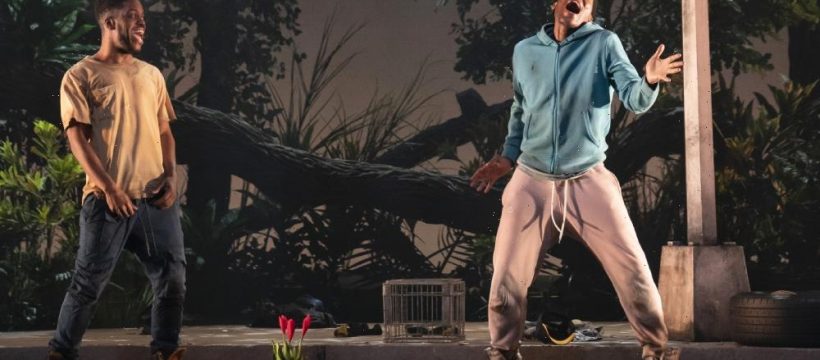In Antoinette Chinonye Nwandu’s surreal and morbidly funny existential drama “Pass Over,” two characters who might be fugitives from a Samuel Beckett play find themselves in a world where being Black means being trapped forever on a blasted heath on the wrong side of the Promised Land.
There are Biblical and literary references galore in the playwright’s seriously brainy meditation on the Black experience, the first full play to open on Broadway since the lockdown necessitated by the COVID-19 pandemic. There are also plenty of vaudevillian pratfalls in director Danya Taymor’s dynamic staging, along with sendups of racial stereotypes and juicy exchanges of street talk that reach new depths of humor. By the time the plot veers into ambiguity at the end, you’ve probably had enough thought-rich fun not to care.
All eyes are drawn to the two tramp-like figures who command the stage. Moses, a hardened denizen of the streets, is played by Jon Michael Hill with a ferocity that attests to a lifetime of hard luck and racist gut punches. Is he mad? You betcha. In Hill’s performance, his rage is barely contained by the covering of his skin. But that doesn’t deter him: In fact, it stokes his passion for plotting, planning and dreaming of escape away from his street corner, across the river and into the land of milk and honey.
Program notes indicate that the playwright wants you to recognize that the contemporary street where Moses’s feet are deeply sunk into the cement also stands in for a slave plantation, “a desert city built by slaves” and a future world to come. That information certainly adds to the dimension of the character, but it doesn’t manifest itself in the language of the play.
Moses’s sidekick — Vladimir to his Estragon, or Estragon to his Vladimir — is a guy named Kitch, a sweet-tempered, life-loving extrovert played by Namir Smallwood with the wit of a clown and the optimism of a child. Like his friend, Kitch is desperate to get off the street corner and begin his life, but something keeps him rooted in place. If it isn’t gunshots, it’s a racist cop (Gabriel Ebert) with a club.
Nwandu’s theatrical idiom — the heartsick poetry of profanity applied to the raging anger of deep existential pain — is its own kind of beautiful. There’s something blood-boiling about the men’s casual revelations of personal suffering, pointed cruelty and the underlying social injustice of systemic racism. This playwright’s voice can be a joy to hear, and her language is often blistering.
Wilson Chin’s set design for the forbidding no-man’s land where Moses and Kitch have paused to ruminate on the futility of their existence is spartan enough to store away for some future production of “Waiting for Godot”: A garbage can, a drunken-looking lamppost, something that looks like a rock — and that’s about it.
Marcus Doshi’s eerie lighting design is especially adept at making day seem night and night seem day, and all of it seem weirdly out of this world. Sarafina Bush’s costumes look both funky-filthy and proud. Kitch’s pants and hoodie may be dirty, but the Key West color scheme of pink and turquoise reflects the character’s endearing joie de vivre. Moses’s outfit is darker and dirtier, which is a spot-on look for this angry young man.
Reviewers are discouraged from speculating on the finale, which has gone through various rewrites since the show originated at Steppenwolf in Chicago in a production filmed by Spike Lee, and went on to play Lincoln Center. Cover your eyes if you don’t want me to spoil your fun, but: I really, really want to know how many of these guys make it over the River Jordan to the Promised Land.
Source: Read Full Article
